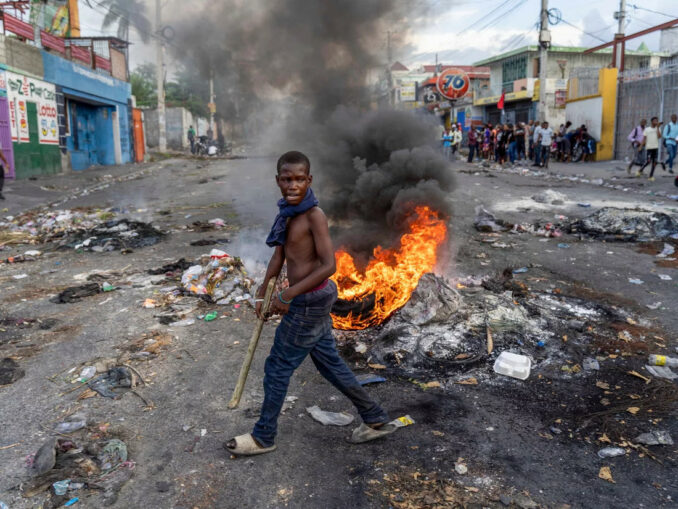

A barricade burns in Port-au-Prince during a protest against Haitian Prime Minister Ariel Henry, with demonstrators calling for his resignation.


A barricade burns in Port-au-Prince during a protest against Haitian Prime Minister Ariel Henry, with demonstrators calling for his resignation.
Misery and hunger are afflicting millions of Haitians. According to the Integrated Food Security Phase Classification (IPC), 5.41 million Haitians are “food insecure,” which means they regularly don’t get enough to eat. Most Haitians, according to the IPC report, spend 70% of their income on food.
The IPC report and many other reports claim that inflation, “gang violence” and political instability are responsible for the crisis in Haiti. The New York Times headline “Violence in Haiti Grows Terrifyingly Worse as Gangs Go Berserk” is a good example of this racist media coverage but similar headlines can be found in reports by the U.N. Human Rights Commission, UNICEF, Save the Children, World Vision and in the Associated Press, New York Times, Miami Herald, PBS, BBC, Canadian Television Network and other English language publications covering Haiti. These reports don’t address the role of U.S. imperialism.
“Gangs” — bodies of armed individuals — have been a feature of Haitian politics since the U.S.-backed dictatorial reign of President François “Papa Doc” Duvalier and his son Jean-Claude “Baby Doc” Duvalier. Some gangs were set up by politicians and business owners for their own purposes, others set up by neighborhoods or progressive parties to protect their members and a few by individuals involved in illegal activity.
Almost all of the weapons these groups, also known as “paramilitaries,” use came from Florida — there is no arms industry in Haiti. The ones that politicians and businesses set up often have had better weapons than the cops, who are often hard to distinguish from illegal armed groups. (Haiti-Liberté, Nov. 14)
The National Movement for Liberty and Equality of Haitians for Fraternity (Mouvement National pour la Liberté et L’égalité des Haïtiens pour la Fraternité, MOLEGHAF) charges, “The Haitian elite uses paramilitaries to crush popular Haitian resistance” to keep Haiti under occupation. (blackagendareport.com, Oct. 23)
After MINUSTAH, the United Nations Stabilization Mission in Haiti, ended in 2017, the United States cobbled together the Multinational Security Support (MSS) mission to Haiti, which has been a complete, utter failure in improving conditions in Haiti.
It received the blessing of the United Nations but not its endorsement, which made it difficult to come up with its budget, which the U.S. didn’t want to fund completely. The U.S. finally managed to get Kenya to provide soldiers and leadership, but Kenya has sent less than 400 soldiers of the 1,000 its government promised. Their presence has done nothing to alleviate hunger.
The United States wants to convert the MSS into MINUSTAH 2, but there is a real reluctance inside Haiti to go through another U.S. occupation under the guise of a U.N. mission. China and Russia are also likely to oppose this operation.
Haiti’s ‘original sin’
Haiti abolished enslavement 60 years before the United States, 30 years before Great Britain and 44 years before France. This was Haiti’s original sin in the eyes of the ruling classes — having a successful enslaved people’s revolution.
The United States began an economic blockade of Haiti in 1804 that lasted until the Civil War.
Two decades after the revolution, in 1825, France’s King Charles X sent a fleet of warships to Haiti and demanded Haiti pay reparations for the loss of its “property” — even though its enslaved people, most of whom were born in Africa, had bought their freedom with heroic acts of bravery and sacrifice.
Under the threat of an invasion and a new war, Haiti agreed to take out a loan. With a usurious rate of interest, this loan cost Haiti $560 million in today’s dollars. Furthermore, the double debt cost Haiti from $21 billion to $115 billion in lost economic growth over time. (nytimes.com, May 22, 2022)
Beyond these extractions of Haiti’s wealth by France, U.S. Marines seized Haiti’s gold reserve in 1915 and sent it to National City Bank. The U.S. then ran Haiti’s national central bank until 1934 to its own advantage.
It is clear that Haiti deserves reparations from both France and the United States.
The epic struggle of the Palestinian people against the full weight of U.S. imperialism and…
The following report comes from the Bronx Anti-War Coalition organizers on a protest held in…
In the Canadian federal elections held on April 28, the Liberals won with 169 seats…
The following is Part 2 of a talk given by the author to a meeting…
Boston Students, professors and workers are confronting the Trump administration’s fascist crackdown at universities across…
Philadelphia Within days of Swarthmore students reviving a pro-Palestinian encampment on April 30, police arrested…